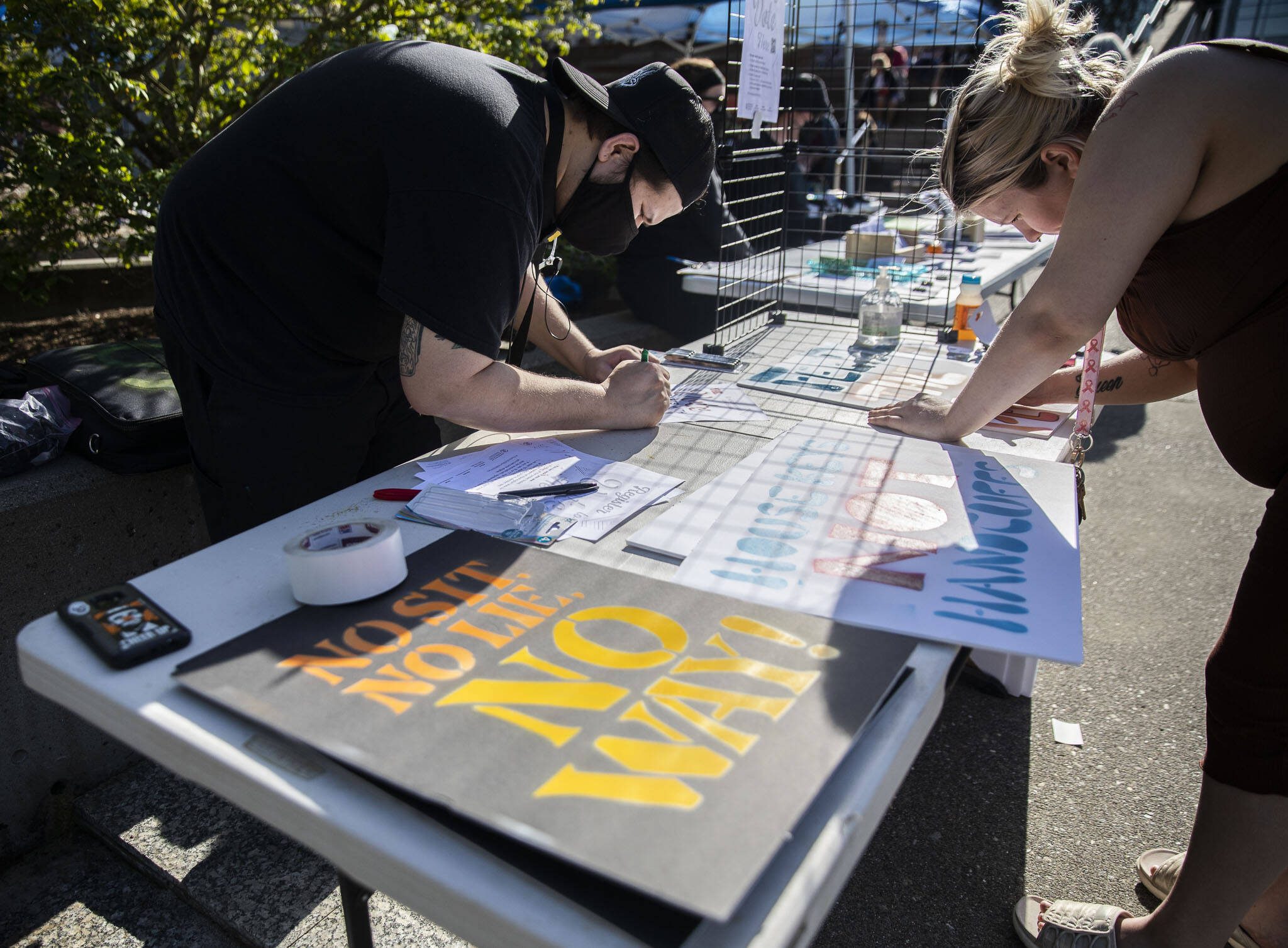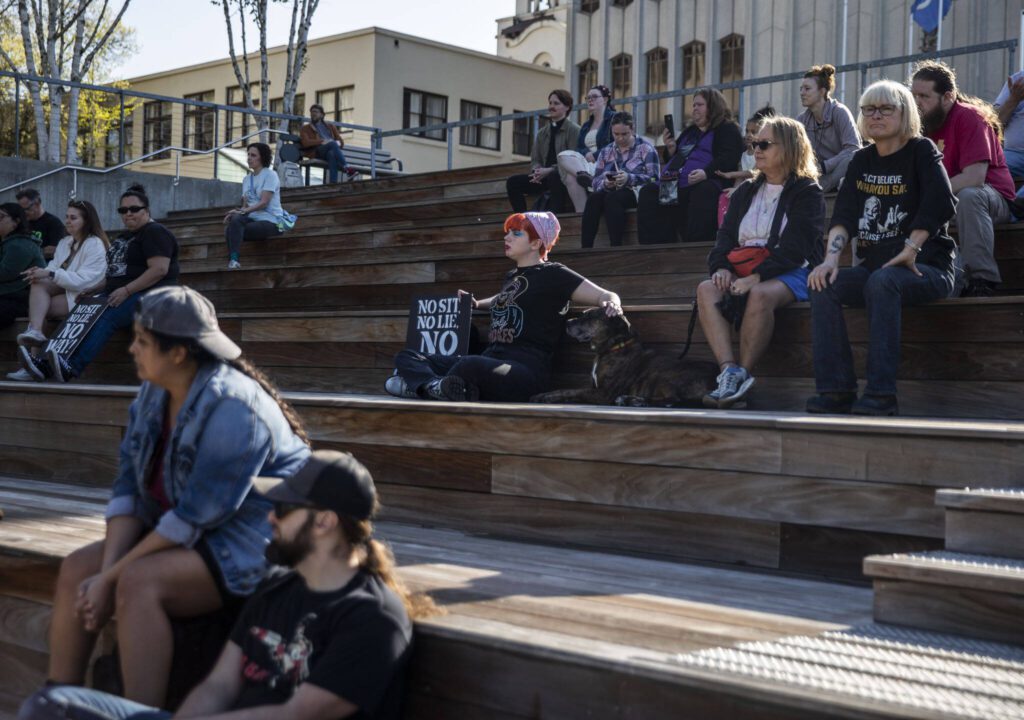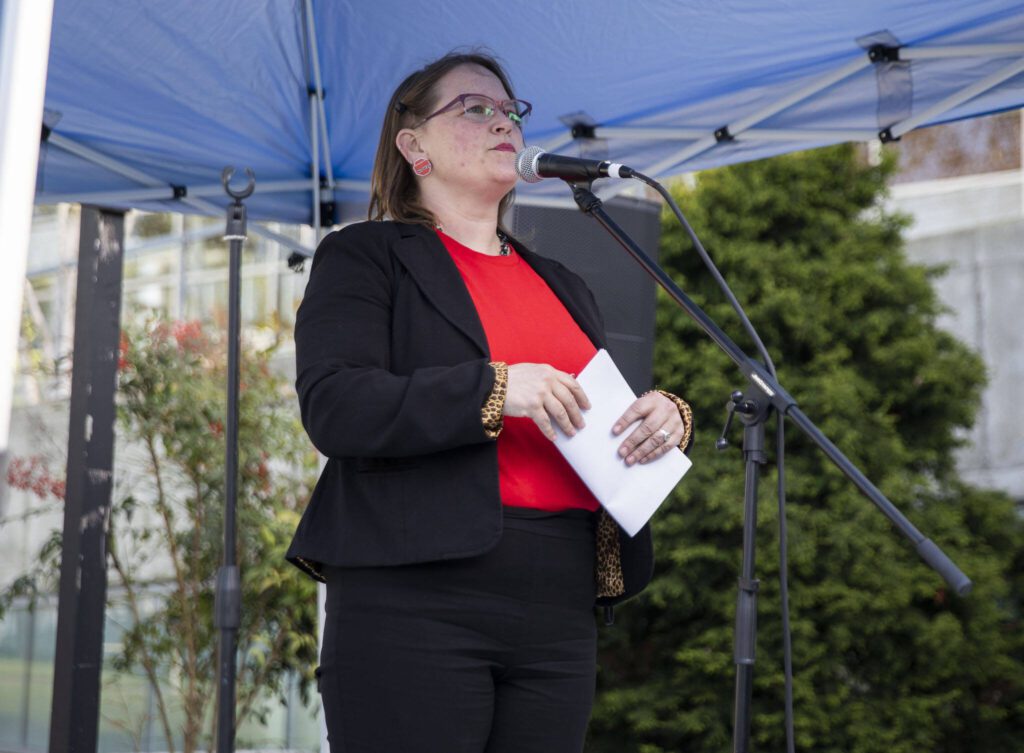EVERETT — The Everett City Council expanded its “no sit, no lie” law Wednesday, giving the mayor new authority to set buffers around social service providers and areas “highly impacted by street-level issues.”
The council in 2021 approved the law that created a buffer zone around the Everett Gospel Mission, which runs a homeless shelter on Smith Avenue. The ordinance made lying down and sitting on nearby public property — mainly sidewalks and streets — a misdemeanor with a fine up to $500 and 90 days in jail.
In April, city staff and Mayor Cassie Franklin proposed expanding that law with broad authority for the mayor to make similar buffer zones as she sees appropriate. It also would ban groups and people from giving food, supplies and water to someone on city property in the buffer zones, unless they have a permit.
On Wednesday, the same day Snohomish County published its annual homelessness snapshot that found an 8.5% growth from last year’s count, the council passed the law on a 4-3 vote.
Everett City Council President Brenda Stonecipher, who voted for the law, said the buffer zones are imperfect solutions to homelessness but can help persuade residents from opposing service facilities opening near them.
Council member Paula Rhyne, who voted against the law, said people should have somewhere they can go before being told they can’t be there. Her request to tie the law’s effective date to when the city opens a day shelter failed on a similar 4-3 vote.
The law drew opposition and support during public comment in recent council meetings.
Lindsey Arrington, founder of addiction and mental service and support nonprofit Hope Soldiers, told the council the past two weeks she supported expanding the “no sit, no lie” law as a way to hold people accountable with compassion.
“We are at a place in the homeless and drug crisis where bad behavior is evolving,” she said. “It’s getting worse, and it’s gone from criminal to dangerous. We need to adjust our empathy and make some room for logic and reason.”
Downtown Everett Association executive director Liz Stenning said the group supports improving access to services but needs help with crime, people defecating in public and vandalism affecting businesses.
“We hear from businesses daily who are witnessing a dramatic increase in public drug consumption,” Stenning said April 26. “Business owners handle biohazards themselves and drug paraphernalia on a daily basis as they try to keep their shops and businesses open and welcoming.”
But other people who lead organizations that serve and work with homeless people have opposed expansion of the “no sit, no lie” zones.
Jason Cockburn, founder of the Second Chance Foundation, agreed with city leaders that something has to be done to address homelessness and addiction. But he disagreed with the stated outcomes of the no sit, no lie law, especially its prohibition on giving out food, water and supplies in the buffer zones.
“What hurts my heart beyond any measure is when I read that law criminalizes me performing passing out water, resources to people in need because that’s the only damn tool I got,” Cockburn said Wednesday. “That bottle and that water and that muffin is the only tool I’ve got to make a human connection with somebody laying on the sidewalk and ask them if they are ready for something else and help.”
Everett resident Mary Rollins said the law, coupled with recent news of the county walking away from buying an Everett church for a shelter, can lead to hopelessness.
“Until you walk in somebody’s shoes who’s been homeless, three times in my case, and know that there’s hope on the other end, you’re not going to be able to change somebody’s mind,” she said last week.
Across the street from Everett City Hall, people who coordinate mutual aid groups and stock a free food pantry and refrigerator in north Everett rallied to decry the ordinance before and during the council meeting Wednesday.
City staff had not selected which service facilities would be affected yet, but Franklin said they’re aware of one “highly problematic” facility now. The mayor could designate the zones based on crime data, public comments and other criteria.
Ambiguity in how the buffer areas would be determined initially concerned a few council members who pushed for a more objective standard that could be applied in the decision.
City staff added criteria to the ordinance for at least six “qualifying events” in the past six months at and near a service provider or property. Those events include assault, disorderly conduct, drug offenses, theft, trespassing, unlawful transit conduct and other things tracked by city employee and crime reports, police calls for service and “credible reports” from the public, according to the ordinance.
Once implemented by the mayor, the zone would remain indefinitely until removed by the mayor, who is required to review each buffer area “at least” every six months, according to the ordinance.
Once service facility buffer zones are made, the city is supposed to publish a map of them online and update them every six months.
The no sit, no lie expansion is scheduled to end Dec. 31, 2025, after the council voted 5-2 to add the sunset Wednesday.
Ben Watanabe: 425-339-3037; bwatanabe@heraldnet.com; Twitter: @benwatanabe.
Talk to us
> Give us your news tips.
> Send us a letter to the editor.
> More Herald contact information.



























